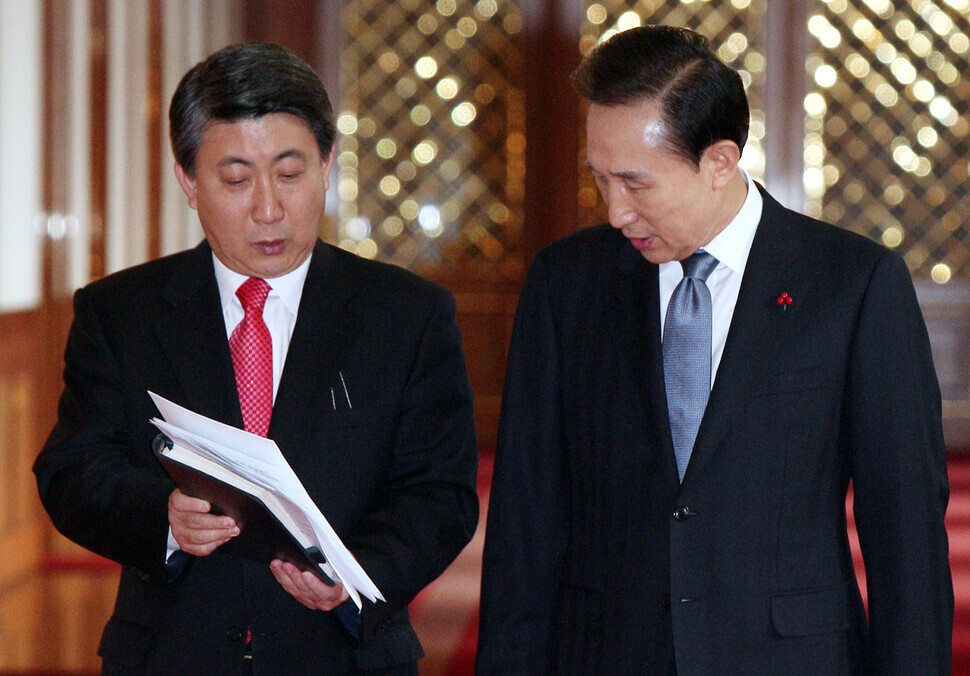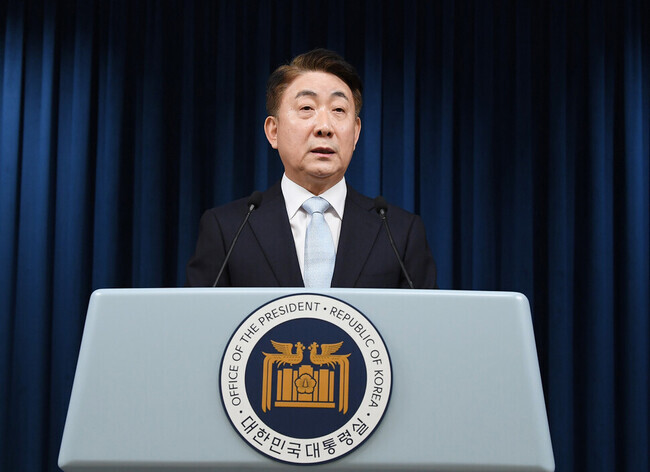hankyoreh
Links to other country sites 다른 나라 사이트 링크
Back to MB? Yoon’s appointments of Lee administration officials spark concerns of backsliding

South Korean President Yoon Suk-yeol continued his practice of appointing officials from the Lee Myung-bak administration to key positions with his decision on Friday to appoint Lee Dong-kwan as his candidate to head the Korea Communications Commission.
During the Lee Myung-bak administration, Lee Dong-kwan is known to have orchestrated illegal monitoring of journalists and efforts to seize control of public broadcasting. Lee Dong-kwan currently serves as Yoon’s special advisor for external cooperation.
The same day, fellow former Lee Myung-bak administration official Kim Young-ho was appointed as minister of unification. The situation has many observers voicing concerns about backsliding in the areas of journalism, inter-Korean relations, and education.
Various records have already shown Lee Dong-kwan’s actions to have been inconsistent with Article 1 of the Korea Communications Commission Establishment Act, which guarantees the “independent operation” of the commission and emphasizes the “freedom” and “public nature” of broadcasting.
Ahead of South Korea’s local elections in June 2010, he was found to have required that the National Intelligence Service “cooperate” with broadcaster managers and “exclude” producers with “left-wing orientations.”
A 2017 prosecutors’ investigation report on illegal monitoring by the National Intelligence Service also included conclusions that the office of the Blue House senior secretary for public relations “formulated a plan to seize control of broadcasting” by the MBC network during the Lee Myung-bak presidency. The director of that investigation was Yoon himself, then head of the Seoul Central District Prosecutors’ Office.
During the Lee Myung-bak administration, Lee Dong-kwan wielded great authority — seen as synonymous with the “core” of Blue House officials.
On July 6, Yoon tapped former Minister of Culture, Sports and Tourism Yu In-chon as a special presidential aide for culture and sports. Yu previously caused controversy with his accusations of “left-wing bias” against members of the cultural community. Kim Eun-hye, the current senior secretary for public relations, was a Blue House spokesperson during the Lee Myung-bak presidency.
In the area of foreign affairs and national security, Kim Young-ho’s appointment as unification minister came last Friday. During the Lee administration, Kim was unification secretary under the office of the Blue House senior secretary for foreign affairs and national security.
Having already expressed hostile attitudes toward North Korea, he is expected to spearhead a hard-line approach toward Pyongyang together with National Security Office First Deputy Director Kim Tae-hyo, who was a Blue House external strategy secretary and planning officer during the Lee administration.
Already, the Ministry of Unification has announced plans to cut positions working in exchange and cooperation duties.
Kim Kwan-jin, the former minister of national defense who was convicted over his role in fabricated internet posts by the military, is now handling defense reform duties as a member of the president’s special advisory committee on national defense reform.

In the area of education, current Minister of Education Lee Ju-ho held the same position during the Lee Myung-bak presidency. At the time, he advocated for an approach of “education to develop the capabilities of outstanding and superior students” — a program exemplified by policies favoring autonomous private high schools.
This approach of heavily favoring figures from the Lee administration appeared to be influenced by multiple factors, including a dearth of qualified candidates in the Yoon administration due to its weak conservative base; the influence of senior presidential office figures who served during that presidency, including Chief of Staff Kim Dae-ki; and the fact that many key figures from the Park Geun-hye presidency ended up facing criminal punishment.
The return of so many key figures from the Lee administration a decade ago is sparking concerns about a return to past government practices. In particular, analysts are voicing worries about side effects beyond those associated with typical “revolving door” appointments — since the individuals in question are figures responsible for causing various frictions and controversy while pursuing their policies.
“Is it really a good approach to have Lee Dong-kwan in charge of media reforms and Lee Ju-ho pursuing education reforms? Or is it anachronistic?” asked political commentator Lee Jong-hoon in a telephone interview with the Hankyoreh.
“For them, the Lee Myung-bak administration might have been a golden age, but how many South Koreans feel the same way?” he asked.
“This kind of return of the ‘old boys’ doesn’t help to resolve present and future tasks,” he said.
Current affairs commentator Park Sang-byeong said, “The Yoon Suk-yeol administration now appears to using ‘holding the past to account’ as a pretext for taking his government approach back to the Lee Myung-bak presidency.”
A key official in the presidential office replied, “Didn’t the Moon Jae-in, Roh Moo-hyun, and Kim Dae-jung administrations all do the same thing [with their appointments]?”
“The appointments are based on expertise and performance,” they insisted.
By Bae Ji-hyun, staff reporter
Please direct questions or comments to [english@hani.co.kr]

Editorial・opinion
![[Column] Is Korean democracy really regressing? [Column] Is Korean democracy really regressing?](https://flexible.img.hani.co.kr/flexible/normal/500/300/imgdb/original/2024/0705/2917201664129137.jpg) [Column] Is Korean democracy really regressing?
[Column] Is Korean democracy really regressing?![[Column] How tragedy pervades weak links in Korean labor [Column] How tragedy pervades weak links in Korean labor](https://flexible.img.hani.co.kr/flexible/normal/500/300/imgdb/original/2024/0703/8717199957128458.jpg) [Column] How tragedy pervades weak links in Korean labor
[Column] How tragedy pervades weak links in Korean labor- [Column] How opposing war became a far-right policy
- [Editorial] Korea needs to adjust diplomatic course in preparation for a Trump comeback
- [Editorial] Silence won’t save Yoon
- [Column] The miscalculations that started the Korean War mustn’t be repeated
- [Correspondent’s column] China-Europe relations tested once more by EV war
- [Correspondent’s column] Who really created the new ‘axis of evil’?
- [Editorial] Exploiting foreign domestic workers won’t solve Korea’s birth rate problem
- [Column] Kim and Putin’s new world order
Most viewed articles
- 110 days of torture: Korean mental patient’s restraints only removed after death
- 2Real-life heroes of “A Taxi Driver” pass away without having reunited
- 3Koreans are getting taller, but half of Korean men are now considered obese
- 4End of an era? Fans wait to see what Billboard rule changes will do to BTS rankings
- 5Can the IPEF deliver the US dream of an Asian economy without China?
- 6Chip powerhouse S. Korea struggles to strike balance between China’s demands, US pressure
- 7[Column] Is Korean democracy really regressing?
- 8Former bodyguard’s dark tale of marriage to Samsung royalty
- 9National security advisor’s ouster could afford hard-liner Kim Tae-hyo stronger influence
- 10What will a super-weak yen mean for the Korean economy?